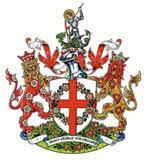History of The Society
The Establishment of the Royal Society of St George
Early February 1894, Bloomsbury Square (pictured) in central London. Two men were hard at work fine-tuning the constitution of the Royal Society of St George (RSStG), an association which, unbeknownst to them, would survive for over one hundred and thirty years. From their offices in the metropolis, these two individuals, Howard Ruff, a Buckinghamshire-born agriculturalist (pictured) and solicitor Harry W. Christmas, embarked upon a mission to awaken patriotic Englishmen and Englishwomen and establish ‘on a permanent basis a patriotic English society’.


Events organised by this association were well-organised and well-attended. In 1883, the St George’s Day dinner was chaired by the Welsh journalist, entrepreneur and Conservative M.P, John Henry Puleston, and attended by, as reported in the Wrexham Advertiser, ‘Englishmen, Scotsmen, Irishmen, and Welshmen, natives of the United States, of the English Colonies, and Englishmen who had travelled all over the inhabitable globe’. The roll call of guests included General Edwin Merritt, the Irish M.P Captain William O’Shea and the English Conservative M.P Albert Pell.
Though the object of the earlier Society of St George was to establish a ‘sort of brotherhood over the whole world’, given the diverse ethnic make-up of the members we see that this organisation was not an ethnically English association akin to the RSStG. Years later, in the early 1890s, when the RSStG was eventually established, Christmas would draw on this experience and attempt to replicate the early success of the Society of St George.
In the RSStG’s nascent months announcements were sent out by Ruff and Christmas inviting ‘all patriotic Englishmen irrespective of creed or party’ to join their fledgling association. From London to Birmingham and Huddersfield to Aberdeen, readers of the national and local press were introduced to the society for the first time. In Scotland, the Aberdeen Evening Express deemed its formation an opportune moment owing to the ‘half-comic despair’ expressed by the English press over ‘the recent appointment of Sir Charles Russell as Lord Justice of Appeal and the selection of Mr Reid as Solicitor-General for England-the first an Irishman and the other a Scotsman’.
In their eyes, the establishment of the RSStG, a ‘response to this Scottish and Irish invasion’ was not ‘exactly one of antagonism’ but more part of a growing impression that England ‘ought in some way to come more to the front’. The notion of competitive ethnicity between the home nations expressed by the Aberdeen Evening Express was similarly present in the minds of the RSStG’s founders. According to co-founder Harry W. Christmas, the association hoped to ‘enter into friendly rivalry with our Scotch, Irish and Welsh kinsmen in seeing that those interests, which are essentially English, are looked after’.
In the metropolis, the location of the RSStG’s headquarters, the needs and wants of the Scots, Irish and Welsh were met to varying degrees through the establishment of Caledonian Clubs and St. Patrick and St. David societies. However, the associational world entered into by the RSStG in 1894 catered to far more than just the home nations; an abundance of associations emerged in the metropolis in the late-nineteenth-century whose remits reflected the imperial world in which they operated. Imperial connections were maintained by the Canada Club, the Dominions Club and the Australasian Club. Other examples included the London Colonial Club and the Imperial Colonies Club, both of which could count a number of RSStG honorary vice-presidents as members: Sir Edmund Barton, Sir Gilbert Parker and Sir Robert Bond. Also among this growing pool of associations was the Authors Club and the Chelsea Arts Club which served those with an interest in literature and the arts, while the Primrose Club, a gentlemen’s club aligned to the Conservative Party, satisfied those concerned with politics.
Into the twentieth century, other elite organisations similar to the RSStG with their own focus on England and Anglo-American relations also emerged, namely the Anglo-American League, the Pilgrims Society, the English-Speaking Union and the International Magna Charta Day Association. A valuable resource for members of the metropolitan elite, these evolving associations, the RSStG included, did not provide members with leisure and conviviality, they also acted as sites where London’s privileged classes could convene and establish and maintain important connections.
By founding the RSStG in 1894, Ruff and Christmas did far more than merely ‘awaken’ the patriotism of Englishmen and Englishwomen. A year after its foundation the first extended reports about the association emerged in the press, chronicling its early, more modest, achievements. The Morning Post reported with great enthusiasm on the association’s success in ‘arranging for the bells of the churches of St Martin’s-in-the-Fields and St Mary Abbott’s, Kensington, to be pealed yesterday’ and in having the ‘banner of St. George flown from the steeples of those edifices’.
More than a century on, the national press continues to report on the activities of the RSStG. In 2014 over fifty branches of the RSStG are active in England with thousands of members proudly celebrating their English identity. Undoubtedly, one hundred and twenty years on from that February meeting, the legacy of Ruff and Christmas remains very much alive.

The Society was granted the right to use the "Royal" prefix by King Edward VII in 1902 and The Royal Charter of Incorporation from HM Queen Elizabeth II in 1963 and this was followed up with its own Armorial Bearings granted under Letters Patent in 1990.
Kindly reproduced from work completed by Lesley Robinson, February 12th, 2014 English Diaspora Research Team
